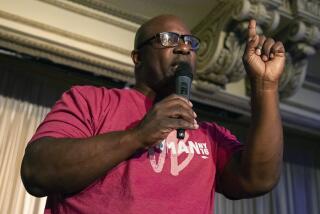NEWS ANALYSIS : Clinton, Brown Head for Showdown in N.Y. : Democrats: Californian’s chances of winning are strong enough to send a chill through party hierarchy.
- Share via
NEW YORK — “If we can’t make it in New York, we can’t make it anywhere,” former California Gov. Edmund G. (Jerry) Brown Jr. told cheering supporters last week as he campaigned for votes in a primary that now looms as a defining moment of the 1992 Democratic presidential campaign.
Brown’s twist on the celebrated song lyric may have overstated the case a bit. But it remains true that in the wake of his upset victory last week in Connecticut, Brown’s chances of winning New York’s April 7 contest are strong enough to send a collective chill through the campaign of his rival, Arkansas Gov. Bill Clinton, as well as the Democratic Party’s national hierarchy
Brown “comes in here riding a wave of disaffection with the political system,” says Harold Ickes, Clinton’s New York campaign manager. “He’s a formidable opponent.”
Clinton strategists privately concede that a Brown victory in New York would create a crisis of confidence for their candidate. While Brown’s own chances of getting nominated still would seem slim--he currently has less than one-tenth of the 2,145 delegates needed to claim the prize--his insurgent campaign would become a major force to reckon with through California’s June 2 primary.
Under those circumstances, many believe Brown would be positioned to help deny Clinton the nomination, forcing the party down the trail to a brokered convention.
“If Clinton wins New York, you’re going to see a lot of people rallying behind him,” predicted one national party official who requested anonymity. “But if Brown wins, you’re going to have upheaval in the party.”
The New York campaign began with Clinton the apparent favorite, though not a solid one. A poll early last week by the Marist College Institute of Public Opinion in Poughkeepsie put Clinton ahead by 15 percentage points. But the poll found that 30% of Democratic voters were undecided and support for both candidates was “very soft,” according to Lee Miringoff, the institute’s director.
The poll was conducted Tuesday, before the impact of Brown’s victory in Connecticut that day had registered. Democratic sources say that since then, Clinton’s own polls have shown the race nearly deadlocked.
As he seeks to sway voters to his banner, Clinton enjoys a substantial financial advantage over Brown in a state where the costs of an extensive media advertising campaign can be higher than the Empire State Building. And his big lead in delegates--he has won almost 1,000 so far--helps him generate an aura of success and inevitability about his candidacy.
But that aura is not nearly as overwhelming as it was less than two weeks ago, when he followed up a series of triumphs in Southern primaries with victories in Illinois and Michigan. New York Democratic Gov. Mario M. Cuomo--who has remained neutral in the race after deciding late last year not to enter the fray himself--last week publicly retracted an early forecast that Clinton had the nomination “locked up.” He also assessed the New York contest as “wide open.”
That opening seems plenty big enough for Brown to drive his bargain-priced bandwagon through to victory. His advisers, in fact, believe their candidate is a better fit for New York’s rugged political environment than is Clinton.
One potential advantage for Brown, a former Jesuit seminarian, is the traditional significance of the Roman Catholic vote in New York Democratic primaries. Clinton, perhaps because of unsubstantiated charges of marital infidelity lodged against him, has attracted limited support from Catholics elsewhere. In the March 17 Illinois primary, for example, a Los Angeles Times exit poll showed that while Clinton won 49% of the white Protestant vote, he received only 40% of the white Catholic vote.
White Catholics are expected to make up about 45% of the New York primary vote, according to Marist Institute director Miringoff.
Brown’s advisers also believe that because nearly 75% of the ballots in the Democratic contest likely will be cast by people living in and around New York City, that minimizes Clinton’s advantage in money and political organization.
“You can do anything you want in New York (City), but you can’t control it,” said Brown adviser and veteran Democratic strategist Michael Ford. “New York is to big to fix. People here are going to make their own decisions.”
Then, too, the city’s relentlessly intrusive press corps shapes up as more of a problem for Clinton and Brown. At the moment, New York’s brash tabloid columnists seem to have little regard for either of the candidates. Daily News columnist Bob Herbert, for instance, typically refers to Clinton as “Slick Willie” and Brown as “the Moonbeam Kid.”
But Clinton, because of his front-runner status and the continuing stream of allegations about his past, makes a more prominent and vulnerable target, at times to his evident discomfiture.
Past voting trends in New York also suggest that differences in the background and style of the two men work to Brown’s advantage. For instance, Clinton’s Arkansas origin, key to his strong showing in the Southern primaries that dominated the election calendar earlier this month, is more likely to be a cultural handicap in New York.
The state’s Democratic primary voters have not been kind to Southern politicians. Tennessee Sen. Albert Gore Jr. won only 10% of the primary vote in 1988, a showing that ended his campaign. And Jimmy Carter lost the 1976 New York primary, when he was on his way to winning his party’s nomination, and the 1980 contest, when he was the incumbent President.
“Culturally, Brown is more acceptable in New York,” claims Ford, the Brown adviser. “He has lived in a real city and his political life has been built around big-city politics.”
Moreover, Brown’s commitment to challenging and overhauling the political system seems well tuned to the pervasive cynicism for which New York City residents are justly famed, fostered by the malfeasance and misfeasance rampant in their local government.
Finally, Brown’s abrasive manner--which repels some voters elsewhere--likely will be easier to accept than Clinton’s genial effusiveness in this contentious city where daily life seems structured around a series of adversary relationships.
But if Brown’s New York opportunity is real, it is also fragile. New Yorkers may well welcome him as an agitator, but if they come to consider him a loser or a crank, they can be expected to reject him out of hand.
Central to this judgment may be the reaction to Brown’s advocacy of a controversial change in the federal tax system that would junk the tiered-rate income tax, the corporate income tax and Social Security taxes. He would replace it with a flat tax system--a 13% tax on personal income and a 13% value-added tax on manufactured goods, which some say would amount to a national sales tax.
As the New York campaign geared up last week, Clinton and his advisers keyed in on this issue as providing a way to put Brown on the defensive in New York, and to not incidentally divert attention from the character questions that have surrounded the Arkansas governor.
“Clinton has been defined for many voters by the character issues that have been raised about him, and Brown has capitalized on that,” said Ickes, Clinton’s New York campaign manager. “Now (Brown) has emerged as Clinton’s only counterpoint and he has to be defined by the elements of his flat tax proposal.”
As Clinton stumped the state last week, he seemed determined to turn the campaign into a referendum on the flat tax. He contends it would result in higher tax bills for poor and middle-class citizens and lower ones for the rich, making it a betrayal of the very voters Brown claims to championing.
Seeing the need to respond to Clinton’s challenge, Brown late last week canceled part of his schedule in Wisconsin, which also holds a primary April 7, to fly back to New York to denounce Clinton’s analysis of his flat tax plan. Brown’s aides say the analysis is based on faulty figures provided by an organization called Citizens for Tax Justice that once employed Clinton’s current campaign manager, David Wilhelm.
Brown’s allies argued their candidate ultimately could benefit from the furor because Clinton had put himself in the position of being seen as a defender of the present tax system,
“They’re doing us a favor,” said Jan Pierce, leader of the Communications Workers Union in New York, which is backing Brown.
Times staff writer George Skelton contributed to this story.
More to Read
Get the L.A. Times Politics newsletter
Deeply reported insights into legislation, politics and policy from Sacramento, Washington and beyond. In your inbox twice per week.
You may occasionally receive promotional content from the Los Angeles Times.








